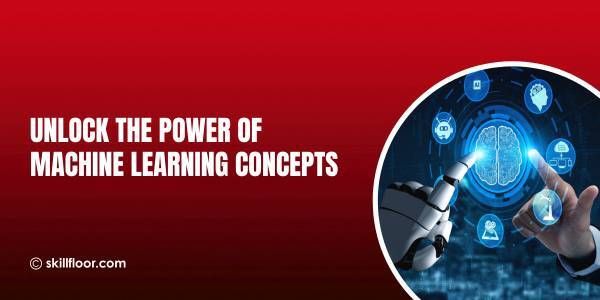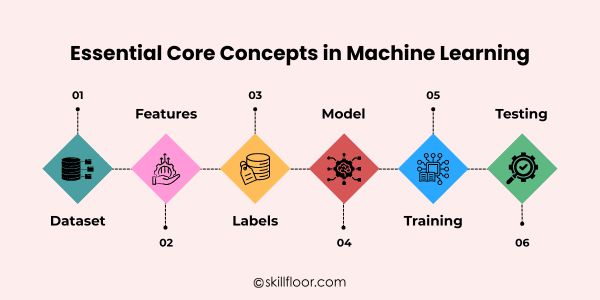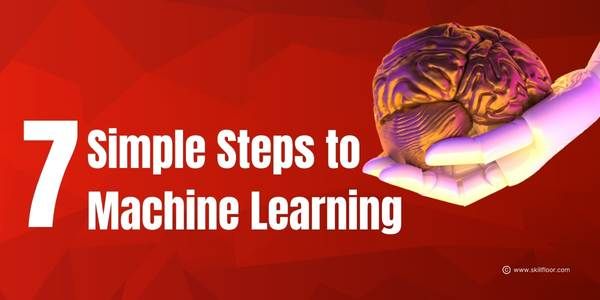Understanding Machine Learning Concepts in Simple Words
Unlock the true power of machine learning in simple terms. Learn key concepts, real-world examples, and how to start leveraging ML today for fun and clearly.

Just think of how your world would change if you didn't show up! Machine learning (ML) is present in everything, including the emails you receive and the shows you binge-watch. Though it may appear complex, machine learning is essentially the process of teaching computers to recognize patterns, absorb knowledge from examples, and make intelligent judgments on their own.
Unknown to you, you have probably encountered ML. Machine learning is used when your shopping app makes product recommendations, your phone anticipates the next song you desire, or spam stays out of your inbox. Understanding the fundamentals of technology can help you comprehend how it learns, adapts, and alters daily life in ways you might not be aware of.
What is Machine Learning?
To put it simply, machine learning is the process of teaching computers to learn from data and make decisions or predictions without needing detailed instructions for each task.
Consider it similar to when you were learning to recognize animals as a child. You became familiar with new animal identification, observed patterns, and viewed a lot of images. Similarly, machine learning analyzes instances, looks for trends, and applies those findings to forecast outcomes.
Key point: A subset of artificial intelligence (AI), which is a more general idea about making machines "intelligent," is machine learning. Deep Learning is a unique kind of machine learning that draws inspiration from the functioning of the human brain.
Why Machine Learning Matters
The way we live and work is being transformed by machine learning. It enables computers to make intelligent decisions, learn from data, and solve issues more quickly than ever before.
-
Improved Recommendations: Based on your past selections and behavioral patterns, machine learning enables apps to recommend movies, music, and goods you might enjoy.
-
Better Healthcare: It can evaluate medical data, identify illnesses early, and assist physicians in giving patients quicker, more precise therapies.
-
Efficient Business Decisions: Businesses use machine learning (ML) to forecast sales, analyze trends, and make more informed decisions that save time and money.
-
Fraud Detection: Machine learning is used by banks and online platforms to identify anomalous activity, stop fraud, and safeguard accounts.
-
Smart Assistants: ML is used by voice assistants like Siri and Alexa to comprehend speech, respond to inquiries, and simplify daily activities.
-
Autonomous Technology: ML is used by smart devices and self-driving automobiles to learn from their environment and gradually increase safety.
Understanding the significance of machine learning enables us to appreciate how it improves technology's intelligence, speed, and usefulness in practically every aspect of life.
Exploring the Types of Machine Learning
1. Supervised Learning – Learning with labeled data
Supervised learning is similar to answer-based instruction. In order to identify patterns and make precise predictions on fresh data, the computer examines instances that already have the relevant labels.
For example, by examining previous emails that have already been appropriately tagged, a computer can learn to recognize emails as spam or not.
2. Unsupervised Learning – Finding patterns in unlabeled data
Unsupervised learning looks for patterns without providing solutions. Using data, the computer automatically identifies hidden structures by grouping related objects together.
For example, businesses can better understand various buying patterns by classifying customers according to their shopping habits without knowing their categories beforehand.
3. Reinforcement Learning – Learning through trial and error
Reinforcement learning involves trying new things, getting rewards for making the right decisions, and getting consequences for making the wrong ones. The computer determines the optimal course of action over time.
For example, by receiving rewards for making the right steps and penalties for making the incorrect ones, a robot can learn to navigate a maze until it discovers the best route.
How Machines Actually Learn
Pattern recognition lies at the core of machine learning. In other words, computers look for patterns or patterns in the information you provide them.
Example: Consider teaching a computer to identify cats in images. Hundreds of pictures, some with and others without cats, are displayed on it. The computer searches for patterns, such as "Cats typically have small noses, whiskers, and pointy ears." It can determine whether a new image has a cat once it has learned these patterns.
However, learning isn’t always perfect. There are two common problems:
-
Overfitting: When the machine memorizes the training instances too thoroughly, this occurs. On previously viewed images, it may identify them 100% of the time, but it may not be able to identify new cat images. Instead of comprehending a subject, it's similar to learning answers by heart.
-
Underfitting: When a machine learns too little, something occurs. It can't accurately distinguish cats from non-cats since it overlooks crucial patterns. Answering questions about the entire story after only reading the first page is similar to that.
The objective is striking the correct balance between training the computer enough to recognize patterns and preventing it from learning everything by heart. Humans learn new skills in a fairly similar way: practice, identify patterns, and get better over time.
The Essential Core Concepts in Machine Learning
Computers can learn and make decisions thanks to several fundamental concepts in machine learning. It is simpler to investigate, use, and construct ML models when one is aware of these fundamental ideas.
-
Dataset: In order to identify patterns, generate predictions, and increase accuracy while working with real-world data, machine learning models utilize datasets, which are collections of information.
-
Features: Features are the crucial information in data that aids machine learning algorithms in comprehending input patterns, spotting trends, and improving predictions for tasks like regression or classification.
-
Labels: Labels serve as the anticipated outcomes in machine learning, directing models during training to accurately categorize or forecast results and guaranteeing precise performance on novel and unexplored data.

-
Model: In machine learning, a model is a system that recognizes patterns in data, analyzes features, and forecasts results using its acquired knowledge and training process.
-
Training: In order to enhance predictions and make sure models function properly on real-world tasks, machine learning algorithms must first analyze datasets, identify trends, and then modify parameters. This process is known as training.
-
Testing: In machine learning, testing assesses a model's performance on fresh data by gauging its accuracy, precision, and dependability to make sure it functions well in real-world scenarios.
Preparing Data for Machine Learning: Preprocessing and Feature Engineering
While feature engineering develops, chooses, and modifies features to increase machine learning model accuracy, data preprocessing purifies raw data by addressing mistakes, scaling, and missing values.
Data Preprocessing
Data Preprocessing Making raw data clean and usable for ML
-
Handle Missing Data: To avoid incorrect predictions and model mistakes, fill in missing data using averages or medians or eliminate incomplete rows.
-
Clean & Standardize: To make data consistent, dependable, and simpler for machine learning algorithms to analyze, fix errors, eliminate duplication, and standardize formats.
-
Scale & Encode: To enable algorithms to reliably identify trends and compare features, normalize numerical values and turn category data into integers.
Feature Engineering
Creating and selecting the best inputs for the model
-
Create New Features: Create new data from preexisting data to offer insightful information that enhances model predictions, like determining age based on birthdate.
-
Select Important Features: Selecting only pertinent factors that have a significant impact on results will cut down on noise and increase the precision and effectiveness of machine learning models.
-
Transform Features: Change data formats, scale values, or group ranges to facilitate the recognition and efficient learning of patterns by algorithms.
Popular Machine Learning Algorithms
Multiple algorithms are used in machine learning to enable computers to learn from data. Some deal with simple tasks like number prediction, while others manage more complicated ones like picture recognition or pattern grouping.
-
Linear Regression: Finds patterns in data to make numerical predictions. For instance, estimating home values according to location or size.
-
Decision Trees: Uses conditions to make decisions step-by-step. Example: Using test findings and symptoms to diagnose a cold.
-
K-Means Clustering: Assembles comparable data points to identify trends. For instance, grouping clients according to their interests or purchasing habits.
-
Neural Networks: It manages intricate jobs and is modeled after the human brain. For instance, identifying faces or things in pictures.
-
Random Forest: Improves accuracy by combining several decision trees. For instance, predicting loan approvals by examining a variety of financial aspects.
-
Support Vector Machines (SVM): Divides information into distinct groups. For instance, determining whether an email is spam or not.
Evaluating Machine Learning Models
It's crucial to evaluate a machine learning model's performance while developing it. The following six factors are crucial to comprehend:
-
Accuracy: Provides a basic understanding of a model's overall performance by measuring the frequency with which its predictions are accurate across all data points.
-
Precision: Shows the proportion of expected positive findings that are true, lowering false positives and enhancing the model's dependability for important jobs.
-
Recall: Indicates the number of real positive cases that the model accurately detects, guaranteeing that significant occurrences or results are not overlooked in forecasts.
-
F1 Score: Gives a fair assessment of the model's prediction performance by combining precision and recall into a single score.
-
Confusion Matrix: You may observe which categories are misclassified and comprehend particular model faults with the help of a table that displays accurate and incorrect predictions.
-
Cross-Validation: Divides the dataset into several sections, using each to train and test the model and make sure it performs consistently on fresh, untested data.
Tools and Platforms for Beginners in Machine Learning
To start exploring machine learning, you don't have to be an expert. ML exploration is easy and enjoyable with a few basic tools and platforms.
-
Python: The most extensively used programming language for machine learning is Python, which is also used for modeling, data analysis, and creating ML projects that are accessible to novices.
-
Jupyter Notebook: Beginners may write, execute, and test Python code interactively with Jupyter Notebook, which makes machine learning experiments simple and straightforward to comprehend.
-
Google Colab: A great way to practice machine learning without having to install any software locally is to use Google Colab, a free online environment for running Python code.
-
scikit-learn: A user-friendly Python package called iscikit-learn offers both supervised and unsupervised machine learning methods, enabling users to quickly create models and evaluate data.
-
TensorFlow: TensorFlow is a deep learning package for creating neural networks in machine learning that may be used for sophisticated modeling, speech recognition, and picture recognition.
-
PyTorch: Another well-liked deep learning framework for machine learning is PyTorch, which provides ease of use and flexibility for building and testing neural network models.
Common Challenges Faced in Machine Learning
Although machine learning is an effective technique, there are a number of drawbacks. Model performance may be impacted by problems such as inadequate data, bias, privacy issues, and resource constraints.
-
Data Quality: Proper data preparation is crucial because poor quality data can confuse Machine Learning models, leading to errors, erroneous predictions, and incorrect outcomes.
-
Bias: Biases in training data may be reflected in machine learning algorithms, producing unfair results and inaccurate predictions in practical applications.
-
Misinterpretation: Careful examination of model output is crucial since not all machine learning predictions are accurate; misinterpreting data might lead to incorrect conclusions.
-
Privacy Concerns: When sensitive data is used in machine learning, privacy concerns may arise, necessitating secure management to safeguard private or sensitive data.
-
Scalability Issues: Machine learning models may be slowed down by large datasets, which makes it difficult to train them effectively and apply them to significant real-world issues.
-
Computational Resources: For beginners without access to advanced hardware, certain jobs related to machine learning might be difficult since they demand a lot of processing power and memory.
The Future of Machine Learning
Machine learning is expanding quickly and will affect several aspects of life. The following are six significant trends and things to think about going forward:
-
Smarter Recommendations: Machine learning will increase the accuracy of tailored recommendations in apps, retail, and streaming, enhancing user experience and making it simpler for users to find pertinent material.
-
Automation in Industries: Manufacturing, logistics, and business functions will be automated by machine learning, increasing productivity while lowering human labor and repetitive procedures.
-
Healthcare Applications: Machine learning will enhance medical diagnosis, disease identification, and treatment planning, resulting in quicker, more precise, and more individualized patient care.
-
Financial Services: By incorporating artificial intelligence into routine financial processes, banks and businesses will utilize machine learning to identify fraud, predict trends, and make better decisions.
-
Transportation Advances: Machine learning will be used in logistics planning, traffic optimization, and self-driving cars to increase overall transportation efficiency, decrease delays, and improve safety.
-
Ethical Considerations: As machine learning advances, fairness, privacy, and accountability will be essential to ensuring that technology advances society without causing harm or unfair outcomes.
Understanding Machine Learning Concepts may feel like entering a whole new world, but in reality, it's about seeing trends, improving decision-making, and observing the effects of technology on daily life. You start to notice Machine Learning Concepts wherever you look, from the music your phone suggests to the way online retailers anticipate your next purchase. You can improve your work and stay current by using Machine Learning Concepts. Machine Learning Concepts become more understandable, and you feel more comfortable with them the more you practice and experiment. Recall that learning Machine Learning Concepts is about taking incremental steps, exploring, and relishing the process of discovery rather than trying to memorize everything at once.































































